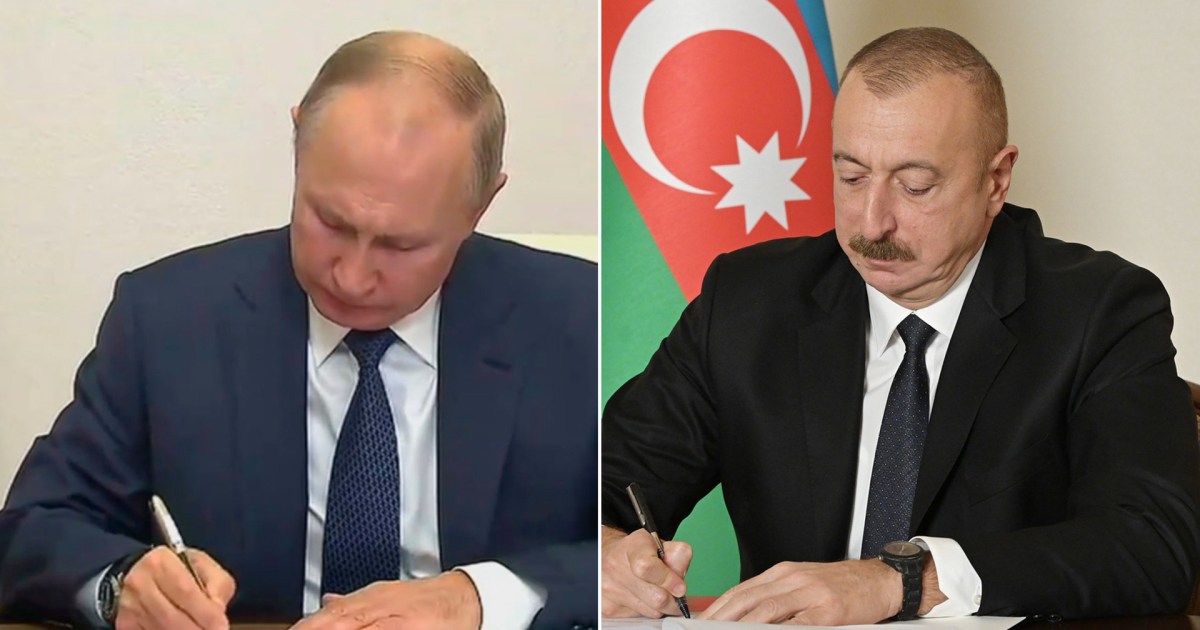In an interview with the episode (10/11/2020) of the "Beyond the News" program, Kaya said that Azerbaijan had won the fighting for 6 weeks and imposed its conditions on Armenia, which had to sign what he called "the instrument of defeat."
Kaya added that the problem between the two countries was partially solved, after the liberation of part of the Azerbaijani lands that were occupied by Armenia, indicating that the coming weeks will witness Armenian withdrawals, and the details of the agreement will also become clear.
On the reflection of the agreement on the situation in the Southern Caucasus region, Kaya said that the agreement means that Turkey can pass by land through the Nakhjuan region to the Azerbaijani lands, which allows direct geographical contact that did not exist over the past decades, which strengthens Turkey's link with the Turkish republics in the region.
Armenia and Azerbaijan - under Russian auspices - signed an agreement ending a six-week war in the Karabakh region, after the Azerbaijani forces announced their control of the strategic city of Shusha, located 15 kilometers from Stepanakert, the capital of the unrecognized Karabakh region.
Azerbaijani President Ilham Aliyev described the agreement as a historical document, noting that it stipulates that Armenia withdraw its forces from the Karabakh region within a short period of time, and that Russia and Turkey participate in implementing the terms of the agreement.
As for the Armenian Prime Minister, Nikol Pashinyan, he described the agreement to stop the fighting in Karabakh as neither victory nor defeat, and considered it the beginning of a new stage for work for the future, stressing that the decision came after an in-depth analysis of the military situation.
Pashinyan revealed several field problems that the Armenian forces faced that could no longer be solved, such as the delivery of equipment to the front lines, the movement of forces from military bases, the lack of volunteer capabilities, and the exhaustion of some soldiers who were in some cases fighting for several weeks continuously, and indicated that the hope for The beginning of the fighting was the imposition of the armistice on the Armenian terms, which did not happen, as he put it.
Crisp compact
On the other hand, Andrei Fedorov, former Russian Deputy Foreign Minister, described the agreement as "very fragile," stressing that it would not last long, expecting that the Armenian parliament would dismiss Prime Minister Nikol Pashinyan as a "traitor", and then Armenia will have a legal right not to abide by this agreement signed by Pashinyan. Without consultations with Parliament or the presidency.
Regarding the Russian position in the event that Armenia withdraws from the agreement, Fedorov said that Moscow will try to persuade Armenia to keep the peacekeepers.
Fedorov justified Azerbaijan's acceptance of the agreement - despite its progress in the field - by fear that the war would expand into Armenian lands, and then Azerbaijan would face Russia, which has a joint defense agreement with Armenia.
For his part, researcher on Arab and Islamic world issues, Salah al-Qadri, said that the war between Armenia and Azerbaijan is not only related to the conflict zone, but rather with a greater international conflict, considering that the Europeans are the biggest losers from what this war has ended, especially after the Russian-Turkish agreement to end the war without participation European.
He added that what is happening now between Armenia and Azerbaijan is nothing but a continuation of what he called the "strategic vacuum" that Europe left in many international files, including Libya and the eastern Mediterranean crisis.
Al-Kadiri attributed this European decline to the "solo playing" of some European countries, citing France's stance on the Libyan crisis and the eastern Mediterranean conflict, which do not enjoy a European consensus.
The Russian-Armenian-Azerbaijani agreement on the Karabakh region provides for a complete cessation of hostilities, and the parties to the conflict will stop militarily at the points where they are stationed on the front lines the moment the agreement is signed.
It also stipulates that Armenia shall return to Azerbaijan sovereignty over the Agdam region by 20 November, and that Russian peacekeepers, up to 1960 military personnel equipped with military vehicles, will be deployed along the ceasefire line in Karabakh, as well as along the Lachin corridor that connects Karabakh, Armenia.
The agreement sets the term of the Russian peacekeepers' mission to 5 years, which can be extended if one of the parties to the conflict does not object.
It stipulates that Armenia will return Kilbajar region to Azerbaijan by the middle of this month, and the Lachin region by December 1, without the agreement affecting the city of Shusha.
It also provides for the return of displaced persons and refugees, the exchange of prisoners, detainees, and the bodies of those killed in the fighting, and that Armenia ensures the opening of transport between West Azerbaijan and the Nakhchivan region, provided that Russian border guards monitor the movement of transportation.

